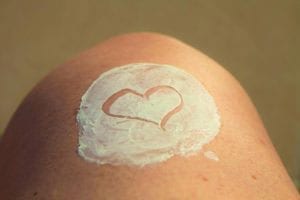Chronic Urticaria
What is chronic urticaria?
Chronic urticaria is also known as chronic hives. Hives are itchy, red welts that appear and fade repeatedly. In order for one’s condition to be considered chronic, they must present with hives that appear for a minimum of six weeks and keep coming back over the future months or years.
What are the symptoms of chronic urticaria?
The signs of this condition include:
- Itching
- Groups of skin-colored or red welts
- Angioedema inside the throat, lips, and eyelids
- Welts that appear and fade multiple times
- These welts can vary in size and shape
These symptoms tend to flare when exposed to certain triggers, such as stress, heat, or exercise.
What causes chronic urticaria?
Histamines, along with other chemicals, are released by certain cells, resulting in the characteristic symptoms. In many cases, doctors are unsure as to what causes the cells to do this. Possible causes include:
- Infection
- Alcohol
- Certain foods
- Stress
- Pressure on the skin
- Pain medications
- Parasites or insects
- Scratching
- Sunlight
- Heat or cold
- Underlying illnesses like cancer or thyroid disease
- This is rare
How is chronic urticaria diagnosed?
Doctors will begin with a physical exam in which they will examine your skin. They will also ask questions in an effort to understand the trigger or cause of the welts. Some doctors ask their patients to keep a diary detailing their diet, activities, medications, supplements, herbal remedies, the location of welts, and the timing of welts.
If your doctor believes that the chronic urticaria is related to an underlying condition, there may be additional testing, most commonly blood or skin tests.
What are the treatments for chronic urticaria?
Over-the-counter antihistamines, such as Claritin and Allegra, and home remedies are the first step in treatment. Doctors recommend loose, light clothing that doesn’t aggravate the skin, avoiding triggers, applying sunscreen, avoiding scratching, no harsh soaps, and soothing any welts with anti-itch creams, lotions, a cool bath, or a fan.
If these methods do not work, doctors may prescribe other medications. These include monoclonal antibodies, anti-inflammatory medications, H-2 blockers, immunosuppressants, antidepressants, and asthma drugs with antihistamines.
Where can I find out more about chronic urticaria?
Chronic Urticaria Articles

Phase 1 Clinical Study Initiated to Evaluate EVO756 for Chronic Spontaneous Urticaria

Dupilumab Improves QOL for Chronic Idiopathic Urticaria, Study Shares




Positive Results Announced for a Phase 1 Trial Targeting Root of Chronic Urticarias







